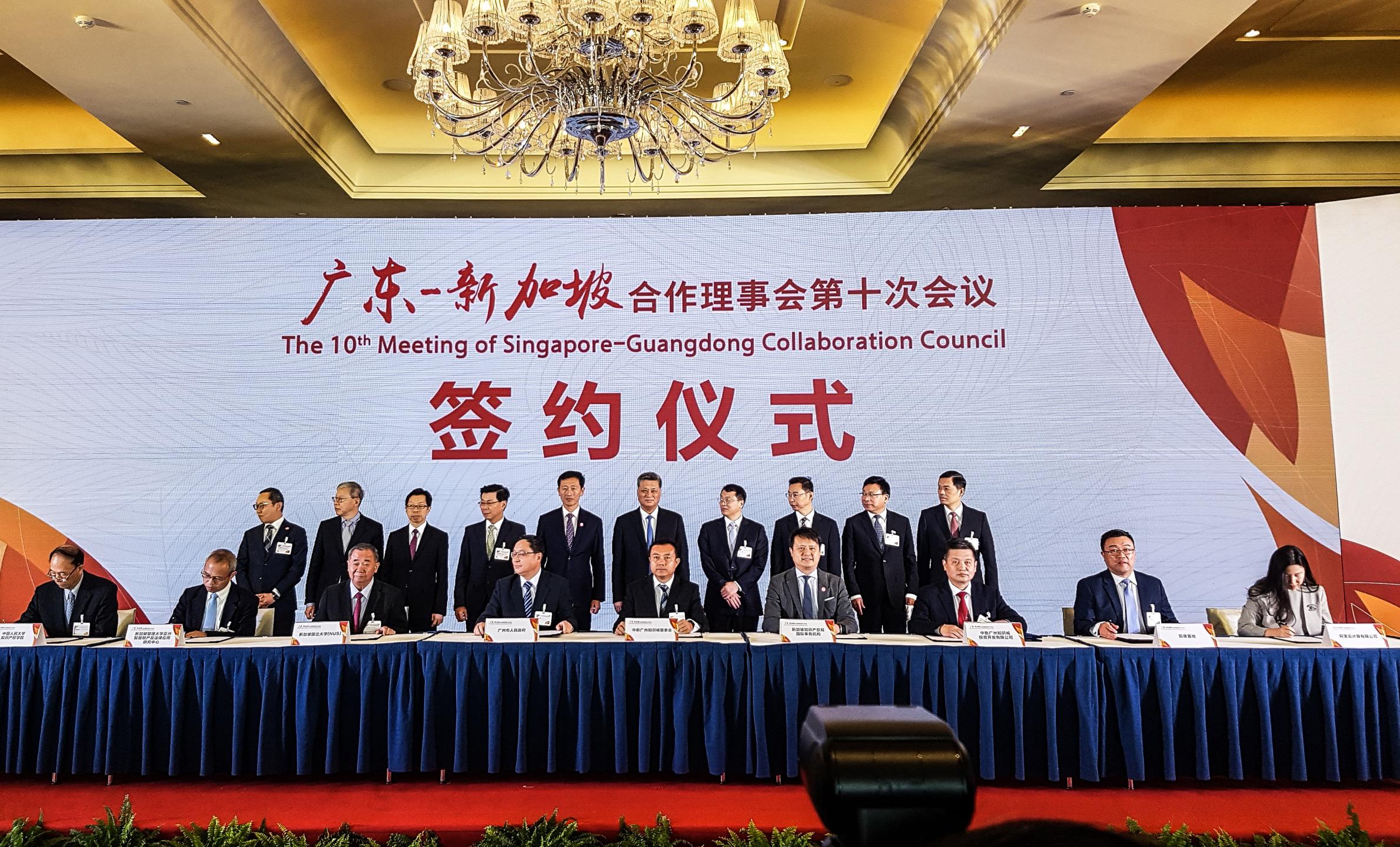The NUS Guangzhou Research Translation and Innovation Institute (NUS GRTII), the fourth and latest NUSRI in China, officially opened on 28 March 2024. It is the university’s flagship initiative in the Guangdong–Hong Kong–Macau Greater Bay Area.
An inauguration ceremony and a forum on smart cities mark the grand opening of the fourth and latest NUS Research Institute (NUSRI) in China.
The NUS Guangzhou Research Translation and Innovation Institute (NUS GRTII), the fourth and latest NUSRI in China, is now officially open. It is the university’s flagship initiative in the Guangdong–Hong Kong–Macau Greater Bay Area — one of the most vibrant hubs for entrepreneurship and innovation in southern China — in collaboration with the People’s Government of Guangzhou Municipality and the China–Singapore Guangzhou Knowledge City Administrative Committee.
The inauguration ceremony of NUS GRTII held on 28 March 2024 was graced by NUS President Professor Tan Eng Chye; Mr Wang Guilin, Vice Chairman of the Guangzhou Municipal Committee of the Chinese People’s Political Consultative Conference, Director of Guangzhou Science and Technology Bureau; Ms Xian Yinsong, Director-General, The People’s Government of Huangpu District, Guangzhou, Standing Deputy Director, Administrative Committee of Guangzhou Development District; and Mr Chen Zhiyong, Deputy Party Secretary of Huangpu District Committee.
From facilitating research translation and pioneering technological innovations, to incubating startups and training the next generation of R&D talent in Guangzhou and the Greater Bay Area, NUS GRTII will be bustling with productivity and game-changing ideas. With a focus on Smart Cities, FinTech, Information and Communication, Electronic Science and Technology, Advanced Manufacturing and Biomedical Technology, the institute will marry entrepreneurial talent and robust research initiatives to catalyse venture creation.

During the ceremony, NUS GRTII Director Professor Meng Qiang inked strategic collaboration agreements with 13 partners, one of which was WeRide, a tech company specialising in autonomous driving technologies. The ceremony also unveiled the first cohort of nine startups to be incubated at NUS GRTII. The cohort included Singapore-based digital PCR tech company JN Medsys as well as Yimiji Technology, which develops AI-based medical image processing and analysis platforms and smart surgical robotics. NUS GRTII will support these ventures through business incubation, technology transfer and research commercialisation efforts that are poised to benefit Singapore, Guangzhou and the Greater Bay Area.
Education is also an integral pillar of NUS GRTII. Over the next decade, the institute is set to train more than 2,200 Chinese PhD and Master’s students, along with post-doctoral fellows and professionals in critical fields. Together, the Huangpu District Government, Guangzhou City Government and various corporate sponsors will offer scholarships that enable aspiring students to pursue their postgraduate studies at NUS in Singapore.
Shaping smarter cities through innovation and entrepreneurship
Innovation and entrepreneurship are the bricks and mortar of modern, intelligent cities. After the inauguration ceremony, the NUS Greater Bay Area Innovation Forum: Shaping Smart City through Innovation and Entrepreneurship took place. The event was a melting pot where experts, scholars and entrepreneurs from diverse fields gathered to exchange ideas and share insights. With a spotlight on driving high-quality development through innovative practices, the forum leveraged Singapore’s expertise in building smart cities to address the evolving needs of the Greater Bay Area.

Discussions at the forum were abuzz with the importance of weaving cutting-edge technology into everyday city operations to enhance the well-being of citizens while promoting sustainable development. Professor Liu Bin, Deputy President (Research and Technology) at NUS, illustrated how advances in materials science could spark breakthroughs in biomedical research. Meanwhile, Professor Lim Chwee Teck, Director of the Institute for Health Innovation & Technology (iHealthtech) at NUS, explored how AI could give healthcare a shot in the arm, giving a taste of the technologies developed at NUS — from pulsed electromagnetic field therapy to smart insoles designed to prevent slips and falls.
The forum also featured two panel discussions, one moderated by Associate Professor Yu Hao Yong, GRTII Associate Director, and the other by Professor Susanna Leong, Vice Provost (Master’s Programmes & Lifelong Education) at NUS. These panels highlighted the integration of healthcare innovations and the role of NUS alumni in regional development — underscoring the interdisciplinary and collaborative efforts essential for advancing smart-city initiatives and stimulating economic and technological growth in the Greater Bay Area.
Watch a recap video of the day’s events here:





